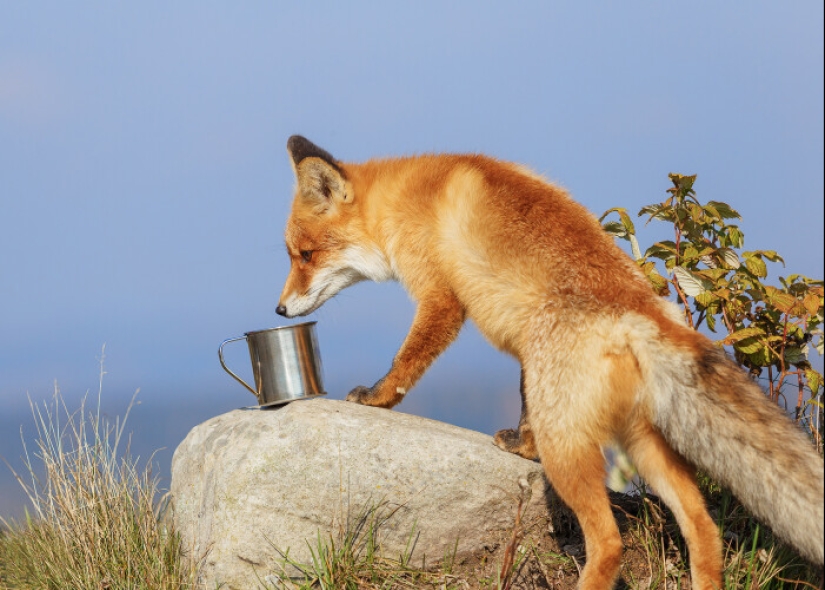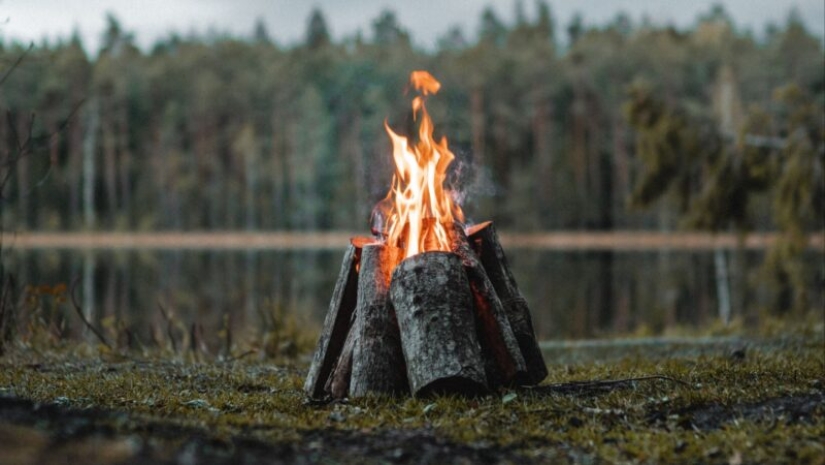Why can't a bonfire protect you from wild animals in the forest
Categories: Animals
By Pictolic https://pictolic.com/article/why-cant-a-bonfire-protect-you-from-wild-animals-in-the-forest.htmlSince childhood, movies and books have taught us that wild animals are terrified of fire and a fire built in the forest reliably protects them from attacks by predators. It is difficult to say who benefits from spreading this misconception, and it is even more difficult to list all those to whom it cost their lives. Yes, predators do not feel delight at the sight of an open flame and generally bright light, but how reasonable is it to hide from them in a lighted circle around a fire?

Many tourists who spent the night near a campfire in the forest, in the mountains or in the steppe are familiar with the feeling of gaze and the feeling that someone is outside the illuminated zone. Many even saw burning eyes in the dark and fleeting shadows. This means only one thing – the fire not only does not scare away wild animals, but, on the contrary, attracts their attention.

In the forests, where people often visit, animals have long ceased to be afraid of bonfires. For them, fire is just a signal that outsiders have appeared, who will always have something to profit from. Where tourists are, there are always bags and bags with food, porridge with stewed meat in the boiler and a lot of edible waste.
At the same time, zoologists claim that many animals come to the camp of people not because of hunger, but simply to satisfy their curiosity. They come close enough, but try not to get caught in the eye. Usually these are small ungulates, for example, roe deer. Fire has a fascinating effect on these animals – they can stand rooted to the spot and watch the fire burn for hours.

Martens, roe deer, sables, wolverines, arctic foxes, foxes are among the harmless animals that can visit people around the campfire out of curiosity or in the hope of having a snack. Sometimes their passion for poking their noses everywhere is used by hunters – they light a small fire, and around it they throw cans, bags and food. The inhabitants of the forest come to profit from food and become the prey of the shooters sitting in ambush.
Beavers and muskrats often come to admire the bonfires built near the shores of lakes and rivers. Birds do not stay away either – owls and owls are frequent guests of tourist and hunting bivouacs, although people usually do not see them. All these forest animals do not cause trouble to people, but, on the contrary, give a lot of positive emotions and impressions.

But when spending the night in the forest, travelers are not worried about martens, beavers and raccoons, but dangerous bloodthirsty predators. Most of all, wolves are feared in the forests and steppes. These predators are actually afraid of fire and even a large flock is unlikely to risk attacking people who are located under the protection of a fire.
But every year there are more wolf-dogs in our forests – a cross between a wolf and a dog. These animals are no less bloodthirsty than wolves, often more aggressive and strong, but the most dangerous thing about them is that they do not feel the inherent fear of wolves for people and fire. No fire will protect you from a pack of such hungry weeds.

Brown bears, who account for the most attacks on people, are not afraid of fire at all. This is not only a very strong, but also an incredibly insidious and cunning predator. A hungry bear can approach the fire without hesitation, knock down a pot of porridge from a tripod or pull a shish kebab out of the grill.
In extreme cases, the clubfoot will not disdain those who prepare this shish kebab. Only a very large fire made of impressive logs can protect from bears, the flame of which rises above human height, as it is bred on Shrovetide. Therefore, if you are in places where bears are found, stock up on good firewood for the night or look for another, more progressive way to protect yourself from a predator.

Among the potentially dangerous animals that the fire will not interfere with, wild boars can also be called. Usually these animals do not approach the fire, as they do not like the smell of smoke and man. But if you have angered or injured a boar, or made it clear to him that you are a danger to his piglets, then you will not be able to escape from his blind rage even in the center of the flame.
Keywords: Animals | Fire | Tourists | Forest | Bonfire
Post News ArticleRecent articles

Most of us think that the color of the eggshell does not play any role and it is possible not to pay attention. But it's not and ...

The more we rely on technology, the more potential power hackers gain over us. It doesn't matter if their goal is to help or cause ...
Related articles

The Mongols seized in the 13th and 14th centuries, a large part of the Eurasian continent, was a force which could not to resist ...

If you like pictures and Internet memes with animals, chances are you've heard of the popular Japanese artist and enthusiast ...

Explosions of smartphone batteries and short circuits in sockets no longer become a sensation, but few people know that the danger ...

Creating a good portrait is one of the most difficult tasks for any photographer. In order to make a really natural and memorable ...